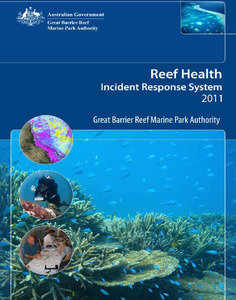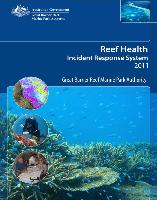Please use this identifier to cite or link to this item:
https://hdl.handle.net/11017/494

Full metadata record
| DC Field | Value | Language |
|---|---|---|
| dc.date.accessioned | 2012-06-08T04:41:27Z | null |
| dc.date.available | 2012-06-08T04:41:27Z | null |
| dc.date.copyright | 2011 | en |
| dc.date.issued | 2011 | en-US |
| dc.identifier.uri | https://hdl.handle.net/11017/494 | null |
| dc.description.abstract | This document has been superseded by a second edition available at http://hdl.handle.net/11017/2808. The Great Barrier Reef is one of the world’s most resilient and best managed tropical ecosystems. However, the long term resilience of the Reef is vulnerable to the increasing simultaneous and cumulative impacts of reef health incidents such as coral bleaching and disease, crown-of-thorns starfish outbreaks, flood plumes and tropical cyclones. Climate change greatly increases the risk that reef health incidents such as bleaching and disease outbreaks will become more frequent and more severe in the future. Whilst the immediate effects of these incidents may be modest, their cumulative impact over time will have significant long-term consequences on the ecology and resilience of the Reef. This includes the resilience of the linked social and ecological communities on the Great Barrier Reef. Because the likelihood of incidents occurring is increasing, along with the consequences of these incidents, the Great Barrier Reef is at increasing risk. This is especially significant given the uniqueness of the resources in the Great Barrier Reef Marine Park (the Marine Park) on a global scale and the importance of the Reef to Queensland’s economy. Indeed, the Great Barrier Reef was recently valued by Oxford Economics at $54.1 billion with as much as 73% of that value at risk during a severe, spatially extensive coral bleaching event. | en |
| dc.publisher | Great Barrier Reef Marine Park Authority | en |
| dc.subject | Great Barrier Reef (Qld.)-Climate | null |
| dc.title | Reef Health Incident Response System 2011 (SUPERSEDED) | en |
| dc.type | Report | * |
| dc.subject.asfa | Climatic changes | en |
| dc.subject.asfa | Coral reefs | en |
| dc.subject.asfa | Ecosystem stability | en |
| dc.subject.asfa | Reefs | en |
| dc.subject.asfa | Bleaching | en |
| dc.format.pages | 12 | en |
| dc.contributor.corpauthor | Great Barrier Reef Marine Park Authority | en |
| dc.subject.apais | Environmental impact | en |
| dc.subject.apais | Environmental management | en |
| dc.description.other | reef health | en |
| dc.publisher.place | Townsville | en |
| dc.relation.connectiontogbrmpa | GBRMPA published this item | en |
| dc.subject.category | Ecosystems | en |
| dc.subject.category | Climate change | en |
| dc.subject.category | Extreme events | en |
| dc.subject.category | Incidents | en |
| dc.subject.category | Water quality | en |
| dc.subject.category | Weeds, pests and disease | en |
| dc.subject.category | Reef managers | en |
| dc.subject.location | Reef-wide | en |
| dc.keywords | Climate change | en |
| dc.keywords | Climate change action plan 1 | en |
| dc.keywords | Coral reef health | en |
| dc.keywords | Incident response plan | en |
| dc.keywords | coral disease | en |
| dc.keywords | coral bleaching | en |
| dc.keywords | diseases | en |
| dc.keywords | A 055 | en |
| Appears in Collections: | Effects | |
Files in This Item:
| File | Description | Size | Format | |
|---|---|---|---|---|
| Reef-Health-Incident-Response-System-2011.pdf | Main article | 1 MB | Adobe PDF |  View/Open |
Items in ELibrary are protected by copyright, with all rights reserved, unless otherwise indicated.
